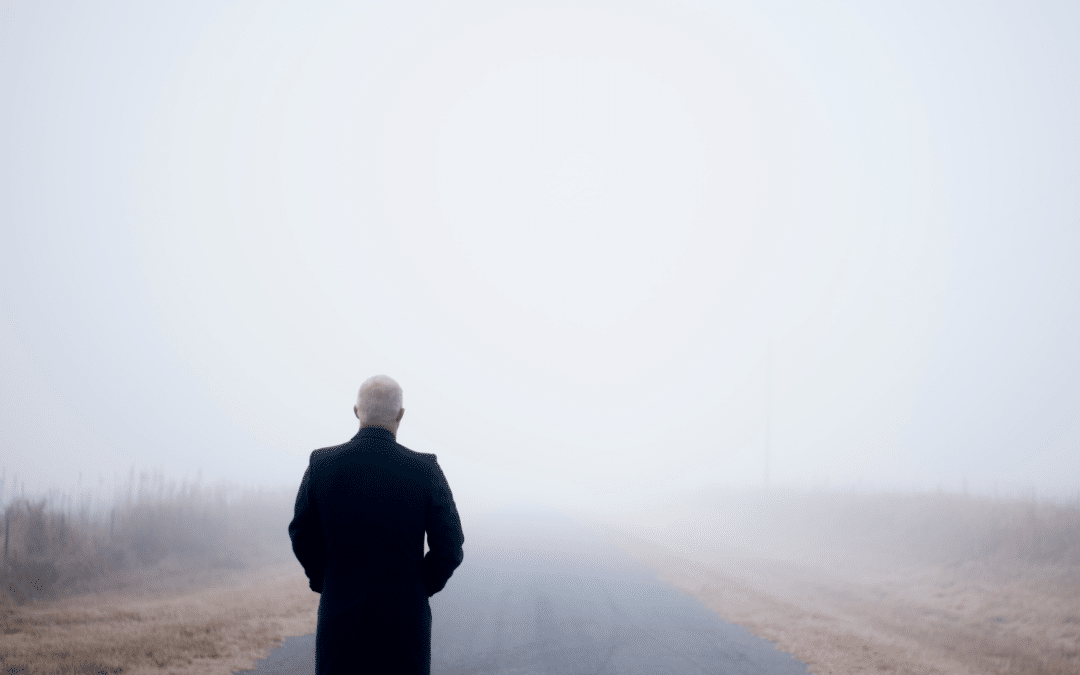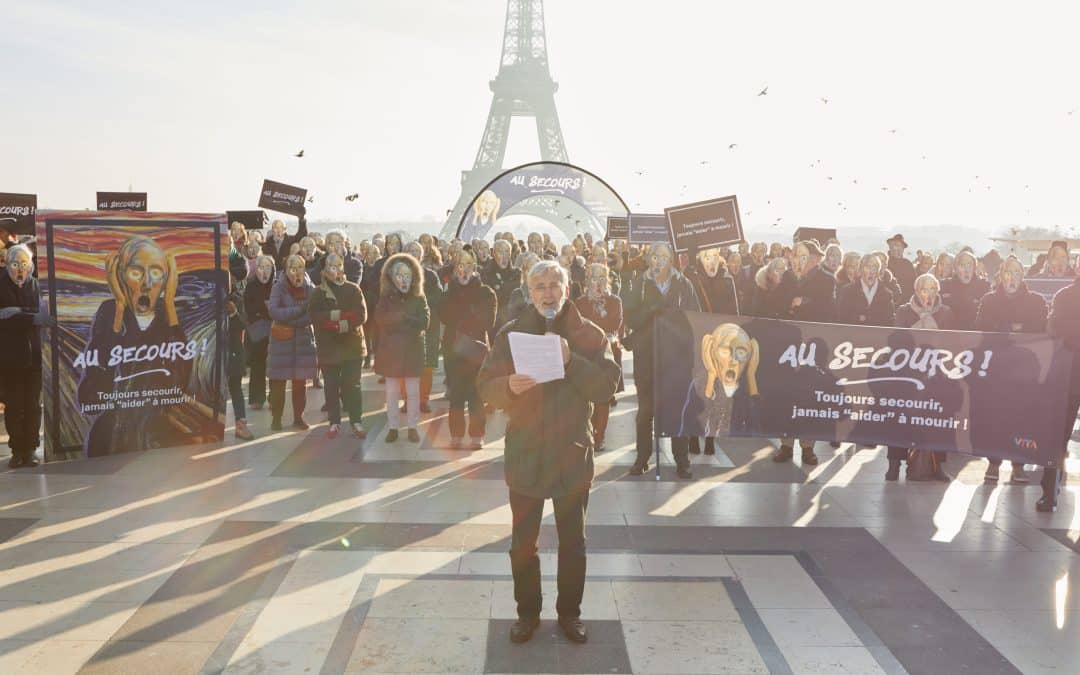What if euthanasia were a social regression?
Part I
The legalisation of euthanasia or assisted suicide could hide a form of social regression. That is the disturbing message in a recently published book of well substantiated arguments. Written jointly by a doctor and a clinical psychologist, its title is: Does euthanasia constitute social progress? The authors describe their experience, working in palliative care for many years in the Seine Saint Denis (93) department.
On the back cover, there is a central question which is often glossed over during debates and avoided by those who support legalisation: “What project do we collectively want for the most vulnerable?”
Deconstructing the slogan “it constitutes social progress”, the authors denounce a widely accepted debate whose aim is essentially individualist. Against a backdrop of claims for euthanasia, there is a narrow conception of freedom, inherent in the maximum number of individual choices which society is committed to provide. Behind the smooth vision of freedom and voluntary, “enlightened” choice, as described by the promoters of medically induced death, there are many questions to be answered:
How can one achieve freedom of consent under the burden of suffering: if it is inadequately relieved? If the patient is alone, deprived of prospects and support?
How can the medical teams take into account the psychological and relational aspects of the disease, beyond the technical aspects?
And crucially nowadays, do the teams have the means to provide an accompaniment which faithfully complies with their Hippocratic oath? The current crisis in the French health system throws a sombre perspective on that point.
In their introduction, the authors question the notion of progress and note that it often stems from a kind of scientism which operates as a “pseudo-religion”: we blindly follow a progress which would inevitably lead us to a life, and a society, freed of all evil. However, history during the 20th century has disproved these enchanting dreams. As they state in their introduction:
“From the very outset of the Nuremberg trials, a doubt appeared regarding the morality of science…one can no longer do without any moral reflection on the proposed scientific experimentations or therapies.”
Indeed, euthanasia has a link with technical advances. The authors recall that certain neonatologist doctors have called for the legalisation of euthanasia for excessively premature births saying “we must be able to undo what we have done”. Thus, euthanasia is often the other face of unreasonable obstinacy, the act which would remove the patient after treatment, not as a person, but as a case.
Behind the calls for euthanasia, the fears of the modern individual: suffering and loss of dignity
In the second part of the book, the authors confront two of the reasons frequently put forward for the legalisation of medically administered death: suffering and the loss of dignity. Denouncing in passing the manipulation of certain opinion polls, and based on their professional experience, they question the representation claimed for the cases of patients for whom nothing more could be done. Based on their shared experience, they recall that “suffering, like happiness, joy, pain and sadness are the constituents of human experience. It is hard to see how the end of life would operate any differently, in the most ordinary way, from what precedes it.”
Moreover, quoting the theory of double effect, the authors state that French law already allows the relief of physical suffering up to unconsciousness, when it is necessary. However, all suffering has an existential dimension which may also signify the refusal to abandon the fight against the disease, to resign oneself to die. Quoting two young men suffering from terminal phase cancer, the authors state that their refusal to let themselves be “relieved” could be “a subjective accomplishment … Suffering often described as rebellious may sometimes be a form of resistance.”
The measurement of suffering, the establishment of a limit beyond which it would be admissible to trigger a medically administered death would be a nonsense:
” The nations surrounding us give us an insight of the impossibility of drawing a line and the reasons for requesting euthanasia increasingly look like an inventory of all the mental or physical pathologies and ailments which can be experienced by human beings.”
Additionally, the book underlines the difficulty of the double or even duplicitous message, on assisted suicide: “How can one legitimise access to death without at the same time vindicating suicide?” What will happen to the call to assist any person in danger? The book recalls: “The subject is far from trivial: every year, between 85,000 and 90,000 people are admitted into hospital following an attempted suicide.”
Pain can be relieved, suffering has a complex existential dimension which makes the legalisation of euthanasia problematic. Yet again, the authors focus on the living conditions and care which may lead to requests to end it all. “Several cases in Canada show that euthanasia can also be a solution to social poverty.”
Listening to the call for “Dying with dignity”, Isabelle Marin and Sara Piazza underline an important point. Under the term of dignity, is the representation “of a being established as an active and valid, independent and autonomous individual.” This is the very heart of the question of the acceptance of dependence, vulnerability, finiteness, which no living being can claim to avoid without deluding themselves. With a streak of humour, the authors recall that
“For some people, dependence and vulnerability may be tolerated: a human being which has to be fed and changed, who dribbles and soils himself may be a source of admiration and wonder, if he is under 18 months old.”
The question of consideration is central, for all and for society as a whole. The “Espace Ethique Île-de-France (Ile de France Ethics Space)” incidentally states that “questioning the value and dignity of the existence of a person further weakens them, and compromises any investment by family members and carers…”.
Finally, the authors tackle the delicate question of death throes. Considered in widespread representations as a time of unnecessary suffering, they recall that, inasmuch as means are available to relieve pain and anxiety, “Death throes are not pathological as such but simply bear witness to the time which certain people may take to die.”
The lack of control of this time by family members and carers “sometimes signifies the very subjective experience of the person, even if unconscious.” Even at the very end of life, it is right that the person should remain subject to their life and escape the control, or even the hold, of others. The prohibition from killing is found to be truly protective.
What if euthanasia were a social regression?
Part II
Behind the mask of autonomy and equality, is the stranglehold of “biopower”.
The wish for total control, although illusory, is at work in a large number of the claims for the legalisation of euthanasia.
A major contradiction weakens the claims by supporters of the legalisation of euthanasia. They claim to be taking back control of their life, and their death. They reject the medical power over patients, whilst at the same time demanding that the decision making and actions should be undertaken by representatives of the medical profession.
Indeed, it is for doctors to examine the cases, to prescribe, and in euthanasia, to administer the lethal product. In the current state of the law, doctors have no right over the death of their patients. But this would be introduced in the event of legalisation: “The illusion of being within the scope of medicine and doctors to decide on one’s own death goes against the deciding power, in fine, of the doctor”. This doctor’s power is just as real in the context of assisted suicide.”
At one time or another, the request is indeed made to be assisted medically (for the ability to produce a substance) which involves validation (authorisation) and a prescription”. Thus, contrary to appearances or to the discussion on euthanasia as a taking back of control by the patient from the power of medicine, legalisation on the contrary signs the submission of self to an increased medical power.
The book then examines the notion of autonomy from other angles than the patient/doctor relationship. In their practices, they regularly hear, not so many requests for euthanasia, but rather the expression of a feeling of uselessness, isolation, fear of being a burden on next of kin, family members, carers etc. Orders, whether direct or insidious, economic or financial pressures are already present.
What will happen if administered death is legalised? According to Claire Fourcade, the president of SFAP (Société Française d’Accompagnement et de Soins Palliatifs – French Society for Accompaniment and Palliative Care), “nobody will be obliged to do it, but everyone will have to consider it”. How can one ask for better living conditions, how can one mobilise energies for the accompaniment of the aged, if an “escape” exists, and even worse, if it is proposed and organised by society?”
As for the claims for legalisation to avoid that only the “wealthy”, can go abroad, to access euthanasia, the authors put forward a position which is “radically different”. It is to ensure equal access for all to palliative care, and to care in general. In the growing crisis confronting the French health system today, there is a major risk of a breakdown of the trust between carers and patients, the latter may wonder whether the ending of treatments is linked to financial considerations. The alternative is not more freedom and equality versus less currently, but a “false promise of emancipation on the one hand versus a true risk of injunction on the other”.
Behind the well-established discourse in support of medically administered death, behind the promotion of autonomy, lies the figure of the performing individual, useful to itself or to the economy which is upheld as a model.
Euthanasia is not a “treatment like any other”, nor the “ultimate treatment”. In fact what does the lethal act actually treat? In a chapter devoted to their experience in palliative care, the authors explain the palliative approach in parallel with curative medicine: a more general approach of the persona, a multidisciplinary practice whereby the entire care team is mobilised. To claim that euthanasia is a treatment, is to consider treatment as a consumable – the very last – which can be requested individually. However, treatment is “a relational affair, a therapeutic alliance “. In the current context “to propose at the same time both palliative care and euthanasia is pure hypocrisy: indeed, the inequality regarding treatment is ever increasing and the question of access to treatment is becoming of increasing concern”.
In a culture where economics dominate, the market is becoming the regulating factor. Where there is offer there is demand. The offer of euthanasia will create the demand. It must be remembered that studies on the question of requests to end it all have revealed a very low rate with end of life patients.
In conclusion, the question of the end of life is therefore eminently political: “Should a supportive society propose a way out for its citizens or do everything possible to improve their life”. Can one ask health workers to go against a fundamental prohibition, that of killing? What will our society become if the message to the most vulnerable is that a way out is possible, or even best?
In their conclusion, the authors state: “We are hoping for a social proposal where the question is not of a dignified death, but rather a dignified life”.





